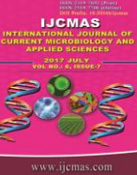


 National Academy of Agricultural Sciences (NAAS)
National Academy of Agricultural Sciences (NAAS)

|
PRINT ISSN : 2319-7692
Online ISSN : 2319-7706 Issues : 12 per year Publisher : Excellent Publishers Email : editorijcmas@gmail.com / submit@ijcmas.com Editor-in-chief: Dr.M.Prakash Index Copernicus ICV 2018: 95.39 NAAS RATING 2020: 5.38 |
Rice-wheat (Oryza sativa L.-Triticum aestivum L.) rotation is the major production system in Asia, covering about 18 million ha. Continuous and conventional RWC system practice has witnessed a significant slowdown in the yield growth rate. The sustainability of this important cropping system is at risk due to second-generation problems (low fertility status, multiple nutrient deficiencies, and imbalanced use of fertilizers, ground water depletion at faster rate, soil salinization, and inadequate system diversity). Our results after super-imposition of treatments on an 18-year rice-wheat rotation trial in eastern Indo-Gangetic plains demonstrated significant effects of crop residues incorporation and Zn application on soil macro-nutrients, micro-nutrients, their availability, soil chemical productivities and crop productivity. Maximum rice and wheat yields were obtained at 100% crop residues incorporation along with 10 kg residual application of starter Zn ha-1. The crop residue incorporation and Zn application increased its uptake by 60% and 57%, respectively. Incorporation of crop residues increased Fe uptake by rice and wheat by19% and 39%, respectively. There was an improvement on soil chemical properties (pH and OC) with crop residue incorporation. The macro- and micronutrients soil availability also increased with crop residues incorporation, whereas Zn application reduced Fe, Cu and Mn availability in calcareous soils. The crop residues incorporation can augment micronutrient availability in the calcareous soils. Our results highlight the research need to understand the mechanisms and availability of macro- and micronutrients under different crop residue incorporation levels and micronutrient application in rice-wheat cropping system, which is crucial for developing innovative nutrient application technologies and associated agronomy for higher yield potential.
 |
 |
 |
 |
 |